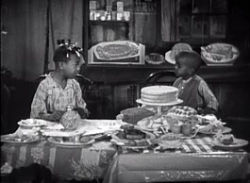Selected Short Subject: Little Daddy (1931) Our Gang
- May 25, 2018
- 3 min read
Updated: Sep 19, 2021
When the Hal Roach-produced Our Gang comedies were re-edited and released to television by King World, their new distributor, there were a handful of shorts that were left out of the TV package, due to the feeling that their presentation of period racial stereotypes had dated to the point of becoming offensive. “Little Daddy” is said to be one of those films. I vividly recall seeing it on Chicago television back in the late 60s when all of the films remained available on TV, but not after the King World took over the films.

This short focuses on Farina (Allen Hoskins) and Stymie (Matthew Beard), two Black youngsters, whose struggles are due to circumstances beyond their control. Their mother has died, their father has been sent to jail for operating a still during this era of Prohibition, and the orphanage officials are coming to take Stymie away. The film then shows how Farina has been effectively caring for his younger brother, having rigged their shack of a home with a variety of Rube Goldberg type inventions (not unlike an earlier Roach silent, “It’s a Gift” with Snub Pollard). With these gadgets he not only arranges for Stymie to take a “shower bath” (which he takes while holding an umbrella), but also prepares breakfast and feeds menageries of dogs and cats. Farina is smart, creative, and resourceful, as well as mature enough to run a household as a de-facto single parent.
At bedtime, the boys have this exchange:
Stymie: Would you tell me a Bible story?
Farina: Sure, which one you wanna hear?
Stymie: I wanna hear about the boat with all the animals
Farina: Do you remember who built that boat?
Stymie: No
Farina: Yeah that’s right, Noah.
Stymie: What you mean “yeah that’s right No?”
Farina: Yeah, he built the boat.
Stymie: Yeah built the boat?
Farina: No, Noah built it
Stymie: Did two men build the boat?
Farina: No, just one man, Noah
Stymie: Who’s this man Yeah, is he Noah’s brother
Farina: No, Noah ain’t got a brother
Stymie: If Noah had a brother would his name be Yeah?
Farina: You ask too many questions! I’m gonna tell you about Daniel in the lion’s den!
This funny verbal exchange was lifted from the old minstrel shows and it works well between the two boys. The camera cross-cuts with alternating close-ups of each, and there is never a two-shot, so it is likely Stymie was coached one line at a time. He responds to the directions perfectly. The editing provides the necessary comic timing.

Farina decides to throw Stymie a going away party, so he gathers the meager amount of coins he got paid for being a church custodian, and fills the shack with cake and ice cream. When he goes to round up the rest of the gang, he returns to find that Stymie has eaten all of the food (there is a hilarious shot of Stymie happily consuming all of the cake and ice cream while Farina is out getting the other kids).
The orphan official arrives (played by frequent Roach heavy Otto Fries) and he is attacked by all of the gang, who bite, punch, rip at his clothes, and roll tires at him. Finally, their school teacher Miss Crabtree intervenes.

“Little Daddy” does not seem stereotypically offensive at all, in fact it is a rather impactful look at poverty during the Depression era, as well as the creative resilience of the central character of Farina. In later years, Matthew Beard would recall “Little Daddy” as his favorite of the Our Gang films in which he appeared.
It also shows Farina's innate acting ability, pleading with the orphan official not to take his brother away. Farina would extend his acting chops upon leaving the gang and appearing in movies with James Cagney and Joe E. Brown.
“Little Daddy” is not one of the funnier Our Gang comedies, it is instead one of the more poignant ones, despite having many very funny highlights (along with these aforementioned highlights, we must add the surreal image of Chubby (Norman Chaney) singing in basso voice dubbed by Charley Chase). The choice to present the underlying dramatic narrative, as well as much of the comedy, from the perspective of the African American children offers a glimpse of Depression-era poverty from that perspective. As cultural history, it holds up well.
Comments